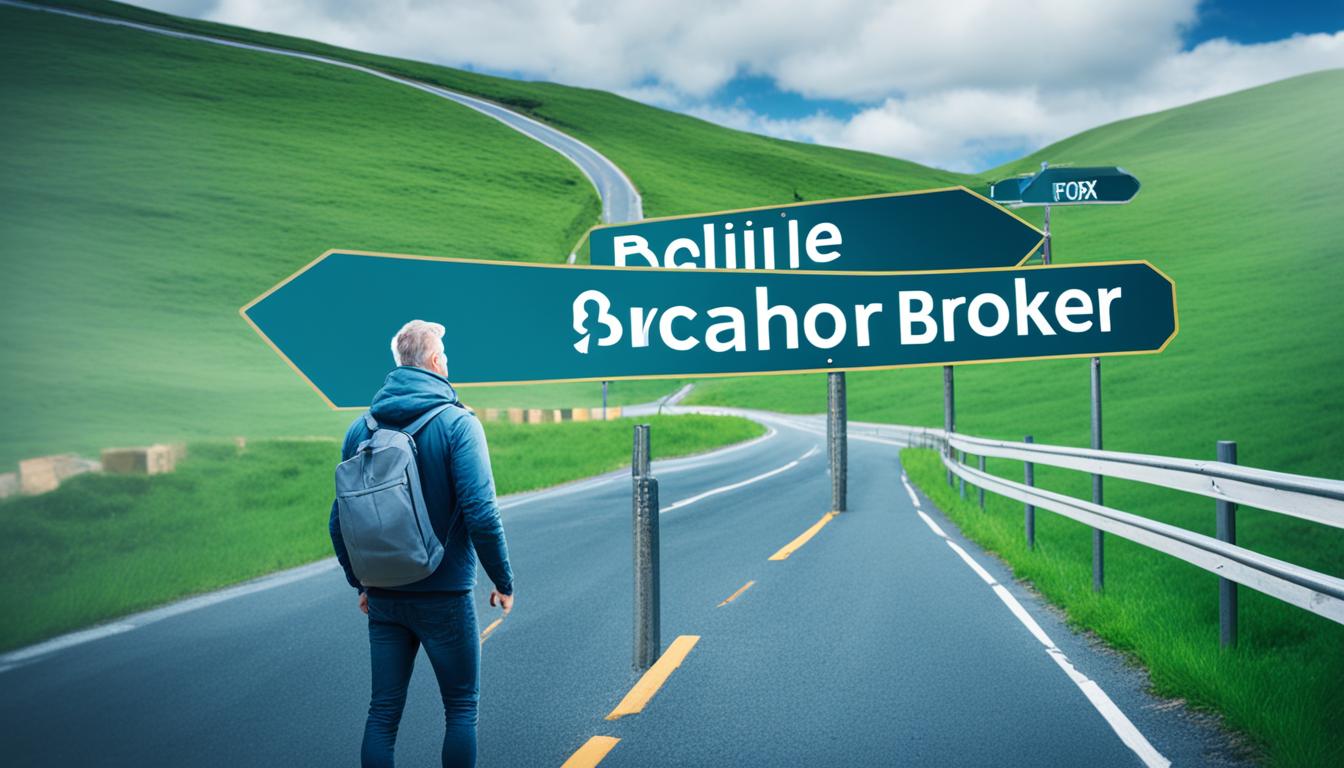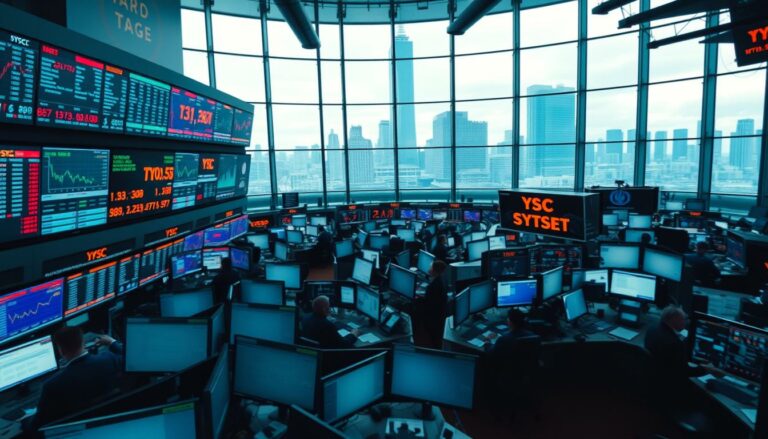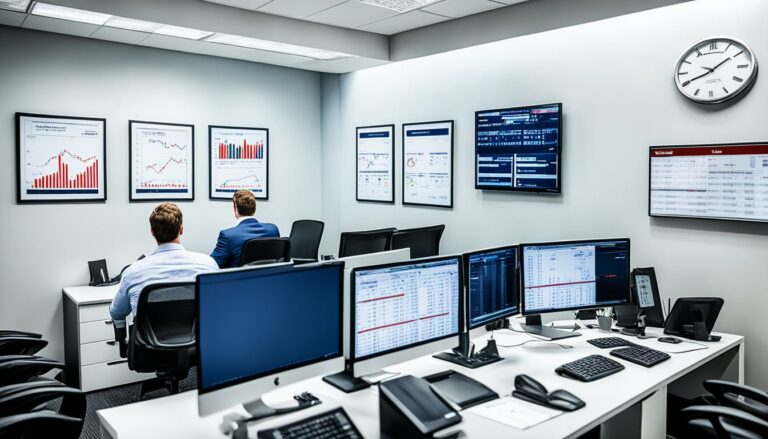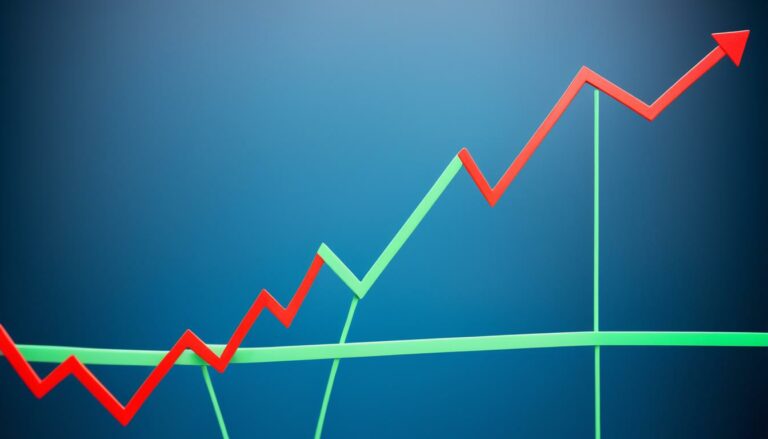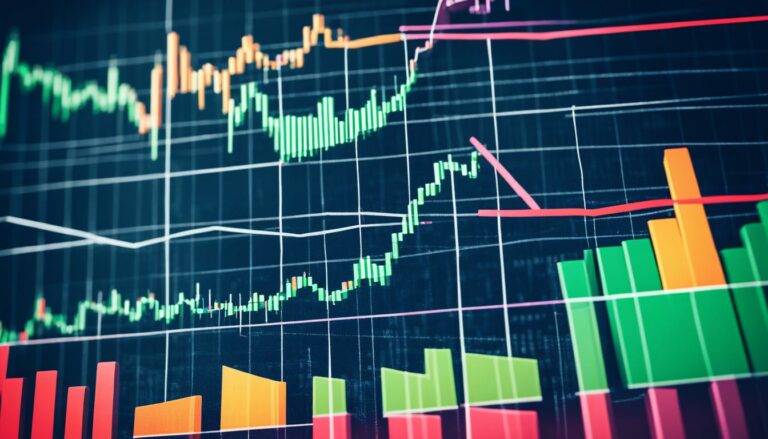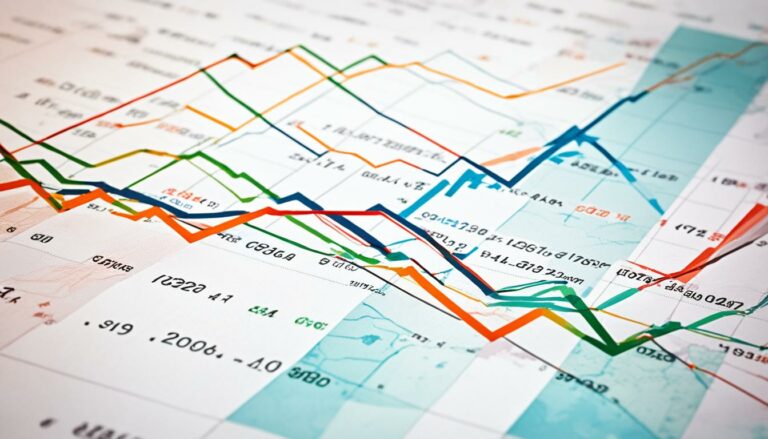Choosing the right forex broker is critical when it comes to trading. The right one can make your experience better, while a bad one can cause trouble. With many choices, finding the best forex broker can seem tough.
Imagine Jake, a new trader, excited to join the forex market. He was full of hope for new opportunities to grow. Yet, the sheer number of forex brokers was overwhelming for him.
Knowing the importance of safety and following rules, Jake searched for secure options. This is when he discovered Dukascopy. It was praised for its close monitoring by industry-respected authorities like FINMA, JFSA, and Bank of Latvia.
Jake, starting out, needed a broker with good learning tools and safe places to practice. Dukascopy stood out with its broad array of educational material. It also offered demo accounts and a range of platforms, meeting Jake’s diverse needs.
He found the JForex 4 platform particularly helpful. It offered advanced tools for detailed analysis, automated trades, and was easy to customize.
For Jake, strong customer service was as important as the trading platform. Good support meant he would never be alone in his trading journey. Dukascopy’s well-regarded customer service, available any time, further convinced him.
Jake eventually picked Dukascopy. It offered what he needed for a successful and secure trading path. Their clear, competitive fees also gave him peace of mind about his trading costs.
In the upcoming sections, we dive into key aspects of choosing a forex broker. We’ll cover regulatory aspects, costs, deposits, trading platforms, and customer service in detail. Let’s get you ready for your forex trading adventure. Keep reading to learn how to find the best forex broker for you.
What is a Forex Broker?
A forex broker is really important for trading currencies around the world. They help both people and big groups trade money. As a trader, a forex broker helps you buy and sell money and deals with the hard parts of the market.
Brokers are like the middleman between you and the market. They give you a space to trade and tools to watch the market. These tools help you make smart choices when trading.
It’s key to know there are different types of forex brokers. They are usually called Dealing Desk (DD) or No Dealing Desk (NDD) brokers.
DD brokers, or market makers, trade against you. They make money from the difference in prices when you buy and sell a currency. This can sometimes cause a problem. But NDD brokers give you a more direct route to trading without these issues. They either charge a small fee or use special systems to keep your trading fast and clear.
Despite different names and terms, there’s mainly just one type of forex broker for people who trade a little. Brokers use different names to stand out and get more business.
Learning about brokers before choosing one is super important. Some brokers may not show the full picture on their websites. It’s smart to read reviews and do your homework. This way, you can find a broker that fits your needs and goals.
What to Look for in a Forex Broker?
When picking a forex broker, think about what you need for your trading. Here are some important things to think about:
- Look at the spread percentage. This shows the cost of trading.
- Check the leverage offered. It can make your wins or losses bigger.
- Fast trade processing is key in forex, where things move quickly.
- Try to find brokers that offer practice accounts to test strategies.
- See what kinds of things you can trade, like different types of currency or metals.
- Choose a broker with a good trading platform, such as MetaTrader 4.
- Think about using automated trading if it fits your strategy.
- Ease of moving money in and out of your account is also important.
There are many brokers to pick from, which can be hard. To keep your money safe, go for brokers that have strong rules in places like the U.K. or Australia. Places like the U.S. have rules that help protect you, too.
Some brokers offer extra services like advice or tax help. Think about what you need and if these extras are worth it to you.
By looking into these points and doing your research, you can find a good broker. They should meet your needs and help you in the exciting world of forex trading.
How to Start Forex Trading
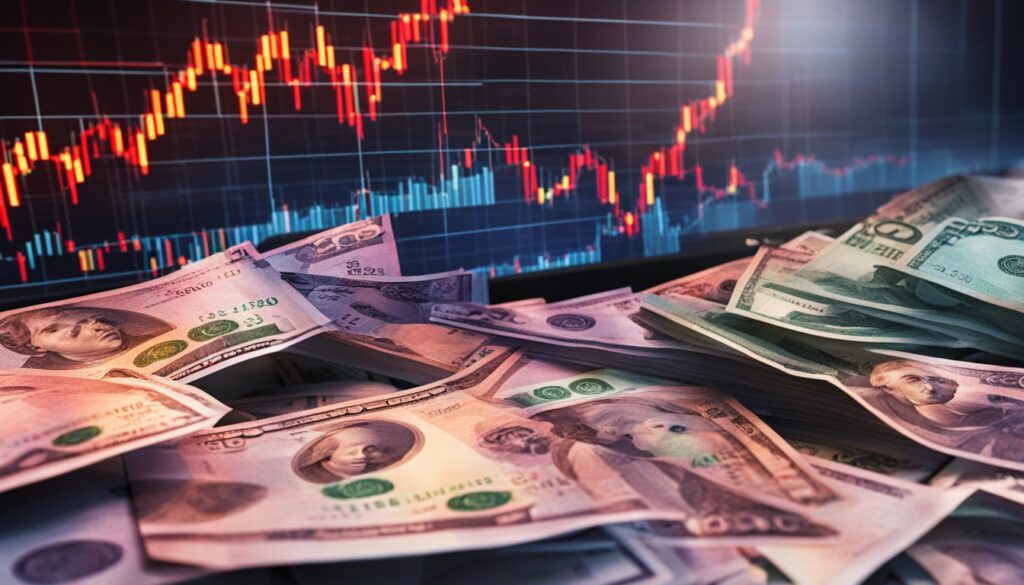
Interested in forex trading? The first step is to open a forex brokerage account. This account is your entry into the global forex market.
Various types of forex accounts exist, each with unique features. Investing accounts let you buy actual currencies. This means you own them and may gain as their value rises. Trading accounts, however, focus on predicting currency pair values. They let you earn from their market price changes.
Before you begin trading, decide on the lot size and amount you’re willing to invest. Lots are batches of currency pairs for trading. It’s vital to know your risk limit. Also, a good risk strategy is essential to increase profits and lower potential losses.
Remember these points as you start trading:
- Choose a broker with a variety of trading products, not just currencies. Find one that also offers commodities, indices, shares, and cryptocurrencies. This diversity can improve your trading experience.
- Learn about different broker types such as Market Makers, STP, DMA, and ECN. Each type meets different trading strategies.
- Fast execution is key, especially for scalping or auto trading. Pick a broker with quick and reliable trades to ensure the best deals.
| Trading Platform | Key Features |
|---|---|
| MetaTrader 4 (MT4) | MT4 is popular for its user-friendly design and tools. It includes analysis tools, buy/sell buttons, and automated trading features. |
Choosing a regulated broker is essential. Pick one approved by recognized financial bodies like the CFTC. This regulation offers protection and solutions in case of problems.
Good customer support is vital. Find a broker with fast issue resolutions and fair treatment. Also, ensure it’s easy to contact a live help desk.
Using demo accounts before trading with real money is wise. They let you practice and get comfortable with the trading platform.
Never forget, forex trading uses leverage. This tool can boost both profits and losses. Understand and manage the risks of leverage. Only invest money you can afford not to have back.
Factors to Consider When Choosing a Forex Broker
Choosing a forex broker involves looking at different aspects. You should consider what account types they offer and how good their customer service is. These steps help ensure the broker fits your trading needs well.
Regulatory Compliance and Safety of Funds
It is key to pick a forex broker that is regulated. Look for those approved by recognized authorities like the US CFTC or the UK’s FCA. A regulated broker offers more security against fraud and keeps your funds safe.
Forex Trading Fees
Trading fees can lower the money you make in forex. It’s important to grasp what fees the broker has, including spreads and commissions. Also, know if they add any extra fees for things like currency conversions.
The table below shows the smallest spread for top FX pairs:
| Currency Pair | Minimum Spread |
|---|---|
| EUR/USD | 0.6 pips |
| GBP/USD | 0.9 pips |
| USD/JPY | 0.5 pips |
Account Types and Leverage
Brokers have different account types and leverage options. This includes various minimum deposits and lot sizes. Choose based on what fits your trading style and risk level best.
Customer Service
Good customer service is crucial in forex trading. Opt for brokers with 24/7 customer support. How well they assist you can greatly affect your trading success.
Our broker, with over 313,000 clients, is dedicated to top customer service.
Deposits and Withdrawals
Knowing how you can fund and take out money is vital. Most brokers support methods like cards and e-wallets. Keep in mind any fees and minimums for these transactions.
We offer free withdrawals for wire transfers and most cards. For cards, the minimum is $300, while there’s no minimum for bank transfers.
Additional Services
Think about any extra features that you might want. This could be like bonuses for new clients. Make sure to read all bonus terms first.
Regulatory Compliance and Safety of Funds
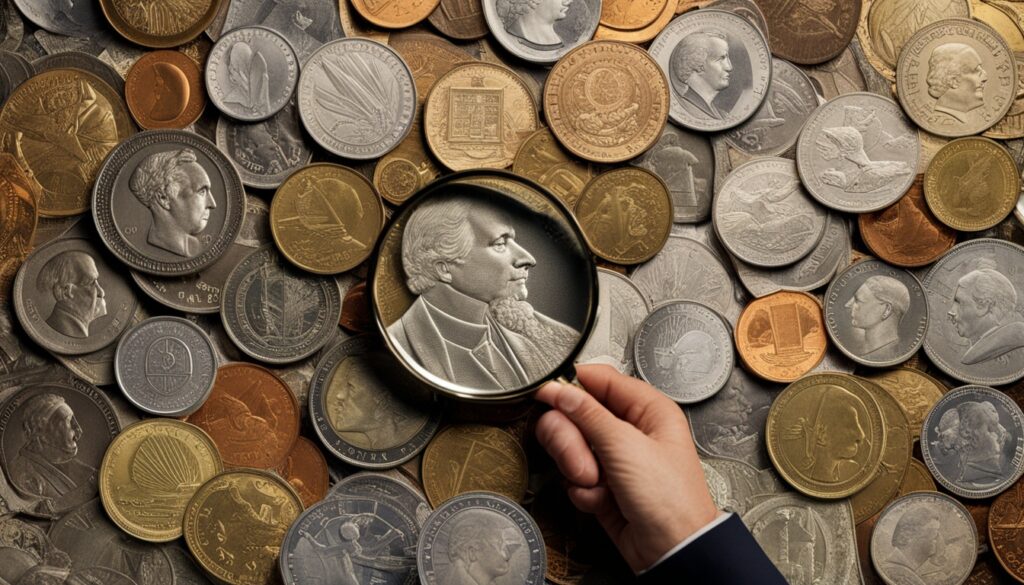
When picking a forex broker, you must think about regulatory rules. Trading forex involves big money, so checking if the broker is overseen by trusted groups is key. Being regulated offers traders protection and keeps the market fair.
eToro is a top forex broker with approvals from many global authorities. This includes the UK’s FCA, Europe’s CySEC, and ASIC in Australia.
Regulated by these bodies, eToro follows strong rules for safe trading. It also meets rules in places like the Middle East, the USA, and others. This shows their global effort for a safe forex market.
The safety of client funds is also very important. XTB, another top forex broker, keeps client funds separate from its own. This separation means if they face financial trouble, your money stays safe and ready to withdraw.
Knowing how fees work is key for your money’s safety. Things like spreads and overnight rates affect how much you earn, especially for frequent traders. Research these costs to make smart trading choices.
Regulating bodies also set money rules for brokers to be financially sound. For example, CySEC requires brokers to keep at least €730,000. These rules help brokers avoid money trouble, showing their focus on financial safety and protecting clients.
| Forex Broker | Regulatory Authorities | Segregated Accounts |
|---|---|---|
| eToro | FCA, CySEC, ASIC | Yes |
| XTB | CySEC, FCA, IFSC | Yes |
Choosing a forex broker that values your money’s safety is very important. By picking eToro or XTB, you ensure your broker follows strict rules and protects your funds well. This lets you trade with trust and peace of mind.
Leveraging and Trading Costs
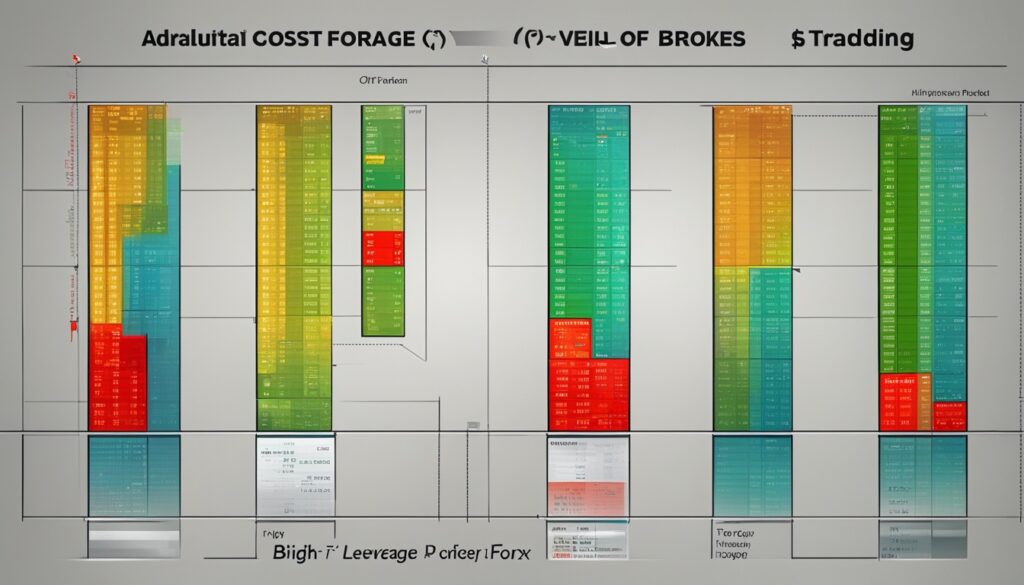
In forex trading, leveraging and costs are key to your profits and risks. Knowing how leverage and trading costs work is smart. It helps you make better choices and enjoy trading more.
Leveraging in Forex Trading
Leverage lets you control big trades with less money. It boosts your chance of making more money. But, it can also make you lose more, since it’s like using a loan to trade.
Professional traders often pick leverage ratios from 1:100 to 1:200. This changes per broker, so choose one that fits how much you want to risk and your strategy. In the US, the highest leverage allowed is 1:50.
Fullerton Markets offers leverage from 1:10 to 1:500, depending on how much is in your account. Their Infinity Credit Bonus can boost your leverage from 1:200 to 1:500, too.
Trading Costs
There are two big costs in trading: spreads and commissions.
Spreads are the gap between the buying and selling price of a currency pair. It’s how the broker earns in each trade. A smaller spread is better for you. For EUR/USD and GBP/USD, common spreads are from 0.1 pips to 2.0 pips, based on your broker.
Commissions are charges for your trades by brokers. Picking a broker without these fees can save you money. Choosing a broker with small spreads and no commissions is good for those watching their costs.
Choosing the Right Broker
When picking a forex broker, think about both leverage and trading costs. It’s important to find one that matches what you need and want.
Consider the highest leverage, the deposit needed, and trading costs for each broker. Do your homework and compare brokers to find the best mix of leverage and savings.
| Broker | Maximum Leverage | Year Established |
|---|---|---|
| Fullerton Markets | 1:500 | 2014 |
| Broker 2 | 1:1000 | 2009 |
| Broker 3 | 1:500 | 2005 |
Picking the right broker means looking at leverage and costs closely. This way, you can pick a forex broker that helps you meet your trading goals. Always think about how leverage can affect your risks. Choose a broker that is clear about their fees and offers good prices to make the most of your trading.
Deposits, Withdrawals, and Trading Platforms
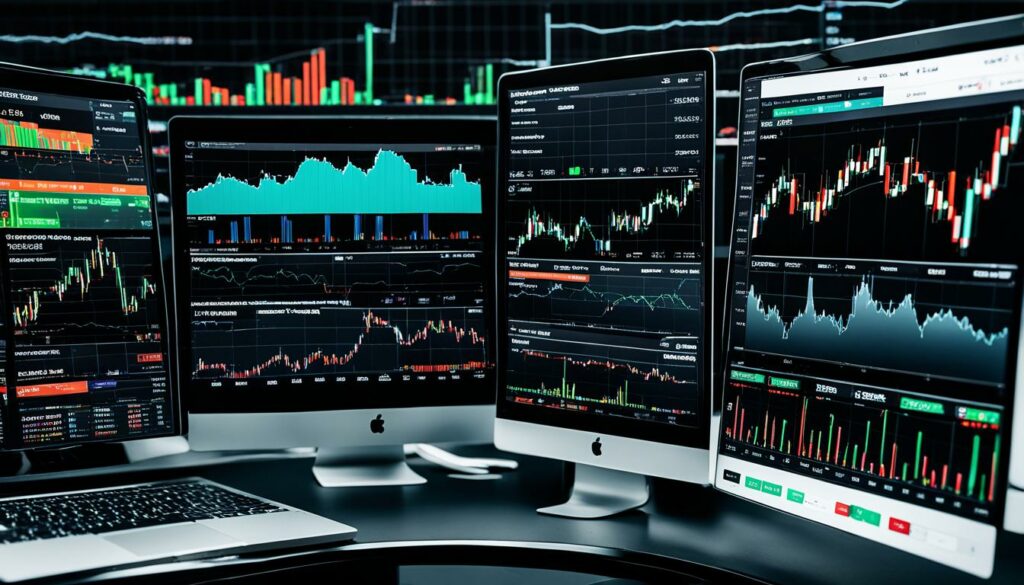
Deposits and withdrawals are key when picking a forex broker. Also, you must think about their trading platforms. Let’s dive into these points to make your choice easier.
Deposits: To trade forex, you start by funding your account. There are many forex account funding methods with each broker. You can use credit/debit cards, bank transfers, or online payments. Some even take cryptocurrency. Make sure the funding methods meet your needs and check the minimum deposit required.
Some brokers need a set minimum, others don’t. Choose one that fits your situation best.
Withdrawals: Withdrawing your money is as important as putting it in. Look for brokers that make it easy and quick to get your money out. They should offer fast processing times without high fees.
However, some may charge for specific withdrawal types or for inactive accounts. Pick a broker with smooth and affordable withdrawal options.
Trading Platforms: Your trading platform is how you connect to the forex market. Choosing a reliable and easy-to-use one is vital. Seek platforms that offer good charting, live data, and fast trade execution.
Popular platforms include MetaTrader 4 (MT4), MetaTrader 5 (MT5), and cTrader. Your broker might also have their own system.Each platform comes with special features but must help with technical analysis and provide live market info. Think about how you trade and what you like in a platform. The right choice improves your trading experience.
Focusing on the details of deposits, withdrawals, and trading platforms really matters. It can make your forex trading journey better and help you reach your financial goals.
Customer Service and Additional Services

Choosing a good forex broker means looking at how they treat their customers. The right support matters a lot when you trade. Make sure they help you fast through phone, email, and live chat when you have questions.
Great customer service isn’t just about being quick. It means having smart people who can really help you. Pick a broker that listens and solves your problems well.
Also, check out what extra stuff the broker offers. Some have lots of tools and info to help you trade better. See if these can help you do well in forex.
Considering both customer service and extras is key. Think about how easy it is to get help and how useful these extra services are to you.
Choosing a Forex Broker by Country or Region
Finding a forex broker that’s local can be a good choice. Countries have their own rules. So, a locally regulated broker gives you more safety. It’s key to look into the rules and reputation of brokers near you. This makes sure you follow local laws.
Picking a forex broker from your area means you get help easily and speak the same language. They know the local rules well. This makes trading smoother. Also, your money is safer with brokers that local financial authorities oversee.
For those who want to be sure their money is safe, going with a licensed broker is smart. They follow strict rules, promising you good service. Steer clear of brokers that aren’t registered, especially if you’re just starting out in trading. This way, you can feel secure about your trades.
Choosing the right forex broker is important for your success. Look for brokers that your country or region’s financial authorities regulate. This ensures your trading is secure, reliable, and always legal.
